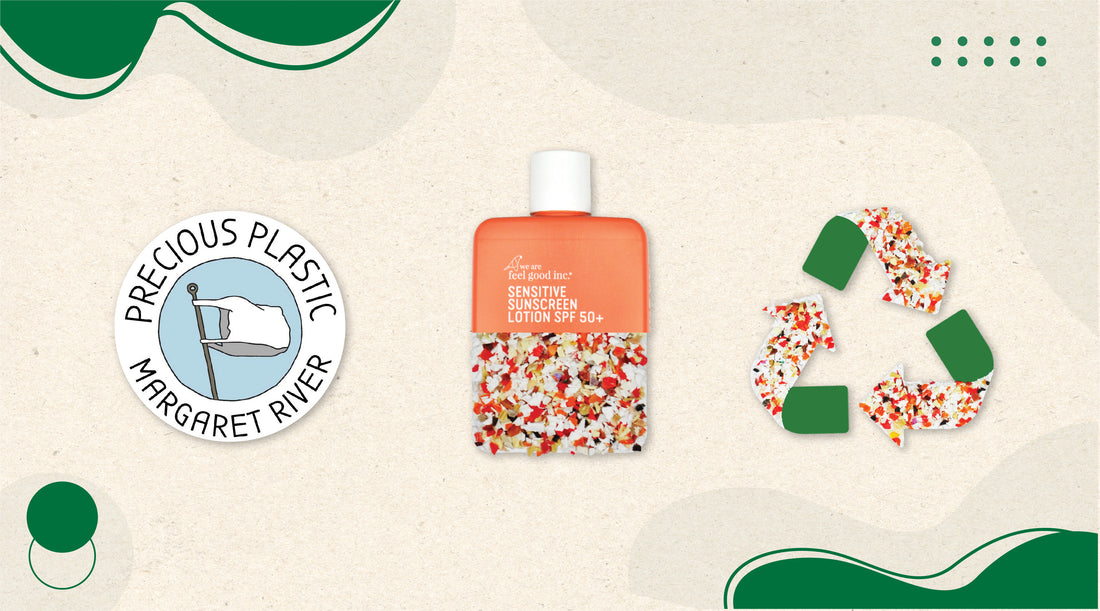
How Can We Help Clean Up Australia? | Q&A w/ Precious Plastic Margaret River
Share
In honour of Clean Up Australia Day this Sunday, we sat down with our local Precious Plastic community leader, ocean-enthusiast and recycling guru, Narelle Kuppers, for a little insight into how we can help #CleanUpAustralia in our own communities and help close the loop on a circular economy.
If you didn't know already, Precious Plastic is a global initiative that uses specially made machinery to grind, melt and inject recycled plastic into new reusable plastic products. Learn about the Precious Plastic innitiative here!
.....
Tell us a little bit about your journey with Precious Plastic Margaret River? When and why did you start?
I wanted to start a business that enabled me to work during school hours and not miss out on important life moments due to work commitments. I had been made aware of Precious Plastic and realised I had the capability to get the machines made, so I put in the time it took for set up without having an income, and 2 years later PPMR was born.
I remember when the penny dropped, we were in Exmouth, Max my son was 4 years old and learning how to surf. We were spending everyday on pristine beaches, experiencing this incredible show of marine biodiversity day after day. We noticed on the beaches and back at the caravan park, bins were overflowing and plastic/rubbish was flying around everywhere (there is still to date no curbside recycling bins in Exmouth). A couple of weeks into our stay, I noticed a family had arrived with trailer they had set up solely to recycle. Each material had a different compartment and they took everything they had bought with them, back with them. I thought to myself, if everyone did that we wouldn't be in this mess we're in... Precious Plastic Margaret River began as soon as we returned home from that holiday in December 2018.
What are the challenges being faced in this area?
The biggest challenges are lack of awareness, knowledge and education.
Fundamentally, most people want to do the right thing but don't have the knowledge to do so. Only a very small percentage of us will go and research how to recycle properly, and that is (at this point in time) the only education available to the general public. Each shire has its own bin system, where different rules apply and it creates confusion. For us, trying to sort each lid by type of plastic is extremely time consuming (most plastics have a number 1-7 printed on them to identify which type of plastic they are), and from our experience approximately 40% of lids are not labelled. You cannot mix different types of plastic together as they have different melting temperatures. You will either burn one type (creating a toxic workspace) or the items created will be flawed, as the materials do not bond. There aren't any government grants that cover wages for this type of work so we rely solely on volunteers to help with this process. The outcome means that we can only recycle the plastic we receive within our local community, if we had more hands, we could recycle more plastic.
Can you explain to us what a circular economy is?
There are 3 main principles to creating a circular economy. First is to eliminate as much waste and pollution as possible, next is keeping the products/materials we have in use, and lastly, regenerate natural systems.
An example of a circular economy is the Bottle Recycling Program We Are Feel Good Inc. have implemented with us (PPMR) to recycle empty sunscreen bottles and turn them into new reusable plastic items, like this comb! To produce the Feel Good products we love, that don't damage our reefs, oceans or us, they are required to use food-grade virgin plastic. To neutralise this, they have set up a system to give this plastic a second life and prevent it from ending in landfill. If you consider for a moment, say Coca Cola putting such a system in place for their packaging, the incredible global impact this would have on pollution.

How can we as consumers do better when it comes to recycling and reducing our plastic footprint?
Reduce, Reuse, Recycle.
Everyone should feel a responsibility towards making the necessary changes to restoring our carbon emissions to an acceptable level. Only then will our children, their children and their children's children experience the incredible joy of watching whales migrating south, turtles swimming past the shore, learning how to surf in crystal clear waters, and maybe even sharing the waves with a with a pod of dolphins. If you want to understand more about what is happening to our planet, I recommend watching the documentary, 2040. Great for ages 7 to 107, easy to understand and has a very positive message.
.....
Are sunscreen bottles recyclable? In Australia, sunscreen is classified as a cosmetic or therapeutic good. This means all of our packaging must be glass, aluminium or 'food-grade’ virgin plastic. Currently, by law, we cannot use recycled plastics as these could hold contaminants. To date, we haven't found a suitable alternative to our food-grade plastic packaging, however, our bottles, lids and tubes are 100% recyclable once used.
So we’ve joined forces with Precious Plastic Margaret River and Precious Plastic Melbourne to help us recycle our We Are Feel Good Inc. bottles, tubes and lids. Click here to learn more!
Every little action a person does to protect the earth accumulates as a community, so let’s do our bit together!
*Updated: 01/11/22